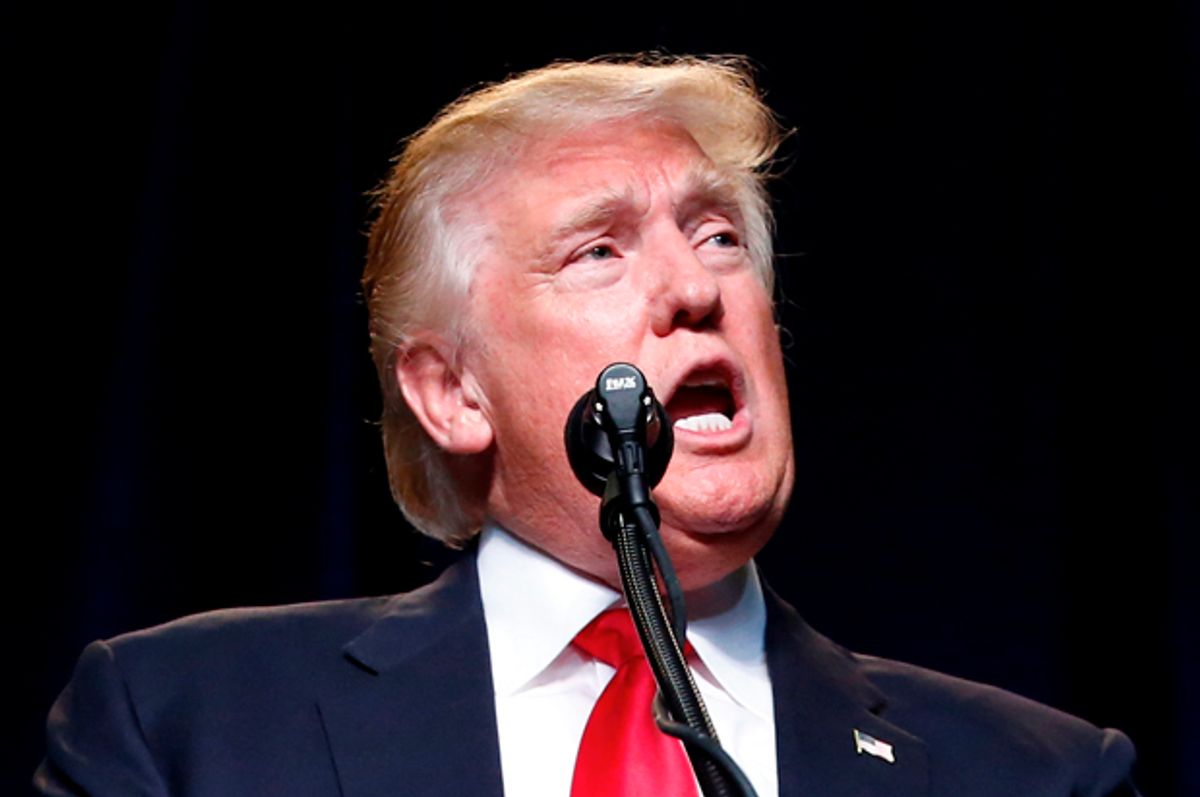The last two weeks have been disastrous for Donald Trump. For those who need a review, I catalogued the cavalcade of errors last Thursday. Indeed, things got sufficiently bad that several Republicans in Trump's orbit were reportedly planning an “intervention” of some kind. True or not, the reports suggest things are in a bad way at Trump Tower.
On Monday, however, Trump gave what a charitable person might call a “serious” speech on the economy. Although littered with false claims, the speech was an attempt at playing a presidential candidate. Trump talked about tax cuts for the middle class, infrastructure spending, trade deals, and his dream of doubling the pace of economic growth. It was an opportunity for the campaign to put out the political fires enveloping them. “We're comfortable we'll get the agenda and the narrative of the campaign back on where it belongs,” Trump campaign manager Paul Manafort told Fox News on Sunday. All of this came after Trump spent the weekend trying to “reset” the campaign at various rallies. Gone were the meandering improvisational speeches Trump tends to give and in were “hand-held scripts” and sober endorsements of fellow Republicans.
It's not surprising that Team Trump is trying to change the conversation. He's lost control of the narrative and after his PR flap with the Khan family, prominent Republicans like Sen. Susan Collins are publicly rebuking him. Worse still, 50 senior GOP national security officials, including former CIA director Michael Hayden, signed a letter stating that a Trump presidency would “risk our country's national security and well-being.” “Trump lacks the character, values, and experience to be President,” the letter reads.
Hence the Trump campaign is right to signal change this week, but no one can or should take them seriously. We've been told countless times over the course of this campaign that a “pivot” was coming. When Trump says or does something outrageous, a surrogate emerges and says he' ready (finally!) to dial down the hysterics. But it never happens. Instead, we see a marginally sane version of Trump for 24 hours or so, followed abruptly by a retreat into his familiar patterns.
Norman Ornstein, a conservative scholar at the American Enterprise Institute, told Salon that he's "amused by the notion that Trump can pivot or reboot...There was no 'reboot' to policy with the so-called economic plan, with few details and numbers that don't come close to adding up." "Where we may see the semblance of a reboot," he added, "is convincing Trump to stop making this an election about Trump and move consistently to making it an election about Clinton - uniting Republicans by pointing out their real enemy, and moving to delegitimize her." Trump could easily have done this months ago, and yet he appears pathologically unable to do so. Which is why his impulsiveness feels contrived.
It's possible – probable even – that Trump doesn't want to reboot. His goal, as I suggested last week, may be self-sabotage. If the campaign is about brand promotion, as everything Trump does seems to be, losing the election without appearing to quit is the optimal outcome. It's difficult to explain Trump's behavior otherwise. The only other explanation requires at-a-distance psychoanalysis.
Consider how stupid Trump's strategy has been: Rather than keep the focus on Clinton, an historically unpopular candidate, he has needlessly propped up bad storylines. And he's done it despite numerous admonitions by those around him. There's no reason to do this if the goal is victory. Against the backdrop of Trump's premature complaints about a “rigged” November election, the case that Trump wants to lose is all the more convincing.
There is zero evidence of voter fraud or electoral misdeeds (the elections hasn't even occurred yet), but saying it's likely sets up the post-election narrative perfectly. As Ornstein put it, if Trump can't "turn the polling numbers around in the next few weeks, he will come back to the election and system being 'rigged,' both to ignite populist fervor and to rationalize any defeat on his part."
I asked Roger Stone, a longtime Trump ally, why make these claims now? “Because the election is likely to be rigged through computerized voting machines,” he told me. Again, these are baseless claims, but floating them now tees up the victim narrative for Trump. From an entrepreneurial perspective, this makes plenty of sense.
If Trump can convince his supporters the election was stolen from him, he walks away with an army of loyal discontents, future customers who will imbibe whatever bullshit he peddles. Is there a better way out of this for Trump? He's not prepared to be president and has shown zero interest in learning what he must. He also knows how badly he could lose and needs a face-saving narrative. The latest surveys from Fox, NBC/WSJ and Marist/McClatchy show Clinton expanding her lead to double digits over Trump. Perhaps Trump can see the writing on the wall.
“He is terrified of facing Clinton in the debates and of losing a general election possibly worse than any major party nominee in history,” GOP operative Cheri Jacobus told me recently. “He would rather feign anger at the GOP and hand the White House to Hillary Clinton as revenge for perceived slights or disloyalty than be humiliated by her in a traditional match-up. Then he will spend the rest of his miserable life trying to get attention with revenge rallies.”
I don't know how “miserable” his life will be, but I suspect those “revenge rallies” will be great fodder for a reality show on the news network Trump is considering launching after he loses in November.



Shares